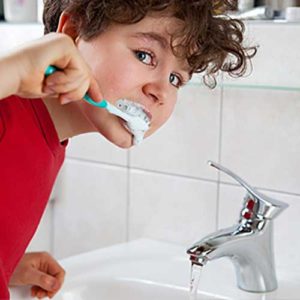4 Tips For Achieving Better Hygiene

You know the basics of great oral hygiene: Brush and floss daily; see your dentist at least twice a year for cleanings and checkups; and watch your diet, especially sweets.
While these are the basics for maintaining healthy teeth and gums, there are a few lesser-known things you can do to enhance your hygiene efforts. Here are 4 extra tips for better hygiene.
Use the Right Toothbrush
As the old saying goes, “There’s a right tool for every job.” Brushing your teeth is no exception. Most people do well with a soft-bristled, multi-tufted toothbrush with a head small enough to maneuver easily in their mouth. Toothbrushes wear out, so switch to a new one every three to six months or if the bristles become too soft or worn.
…and the Right Brushing Technique
Hard scrubbing might apply to housework, but not your teeth. Over-aggressive brushing can lead to gum recession. A gentle, sustained effort of about two minutes on all tooth surfaces is sufficient to remove plaque, the bacterial film most responsible for dental disease.
Wait a While to Brush After Eating
Before hopping up from the meal table to brush, consider this: eating many foods increases mouth acid that can erode your teeth enamel. Fortunately, your body has a solution — saliva, which neutralizes mouth acid and helps restore minerals to your enamel. But saliva takes thirty minutes to an hour to complete the buffering process. If you brush before then you could brush away minuscule amounts of softened minerals from your enamel. So wait about an hour to brush, especially after consuming acidic foods or beverages.
Drink Plenty of Water
Your mouth needs a constant, moist environment for optimal health. But smoking, alcohol, and caffeine can cause dry mouth. Certain drugs, too, can have mouth dryness as a side effect. A dry mouth is more susceptible to plaque formation that can cause disease. To avoid this, be sure you drink plenty of water during the day, especially as you grow older.
If you would like more information on taking care of your teeth and gums, please contact us or schedule an appointment for a consultation. You can also learn more about this topic by reading the Dear Doctor magazine article “10 Tips for Daily Oral Care at Home.”
